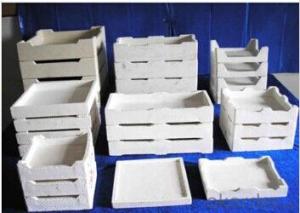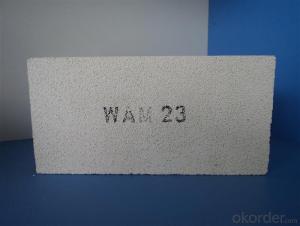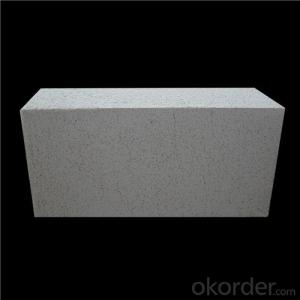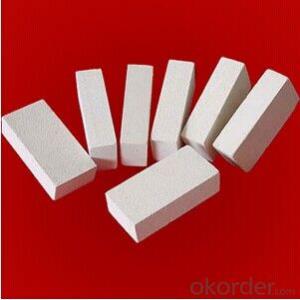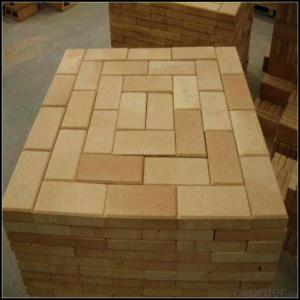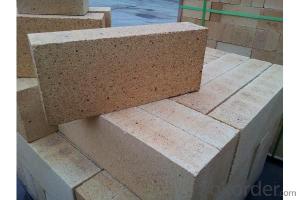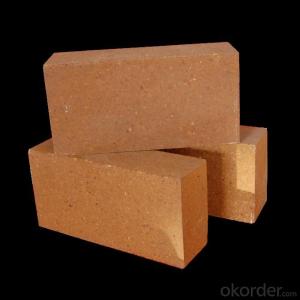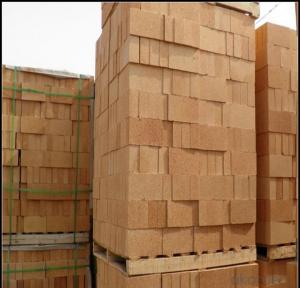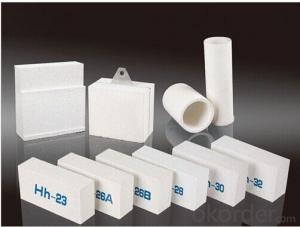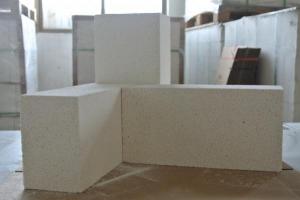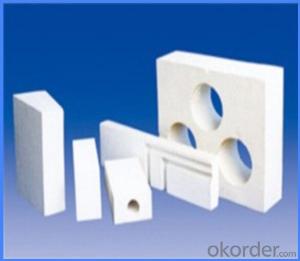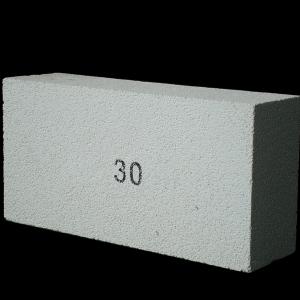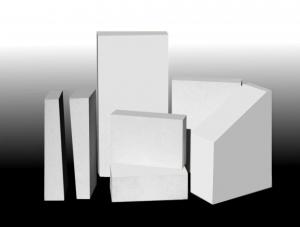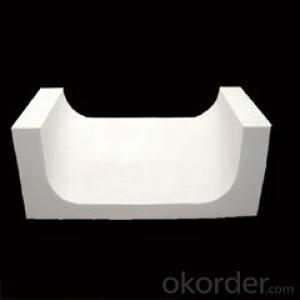Cordierite Kiln Furniture Insulating Fire Brick
- Loading Port:
- China Main Port
- Payment Terms:
- TT OR LC
- Min Order Qty:
- -
- Supply Capability:
- -
OKorder Service Pledge
OKorder Financial Service
You Might Also Like
Material: cordierite &mullite
It is used in heat shock applications that would crack and shatter most other ceramic materials, it can survive thousands of heating and cooling cycles.
it is characterized by high purity, high density, high strength and good thermal shock resistance, is mainly used as high temperature (1350-1650oC) kiln linings or kiln furniture in ceramics and refractories industries, gas combustion furnace in petrochemical industry and other high temperature services where thermal shock happens frequently.
Cordierite porcelain | ||||
Essential components | 2MgO 2Al2O3 5SiO2 | |||
| Density | g/cm3 | 2.5 | |
| Water Absorption |
| 0 | |
Material characteristics | Agglomeration temperature |
| 1350 | |
| Hardness | HV | 800 | |
| AntiFolding Strength | Kgf/cm2 | 900 | |
Physical characteristics | Compressive Strength | Kgf/cm2 | 3500 | |
Tenacity | Map.m3/2 | - | ||
| Highest application temperature |
| 1 000 | |
| Thermal expansion coefficient 0-1000 | / | 4*10-6 | |
Thermodynamic property | Heat resistance | T() | 250 | |
Thermal conductivity | W/m.k(25-300) | 1.3- | ||
|
| 20 |
| >1012 |
| 100 | >.cm | 107-108 | |
| Volume resistivity | 300 | 3*105 | |
Electrical specification | Insulation breakdown intensity | KV/mm | 10 | |
Dielectric constant | 100MHz(E) | 6 | ||
- Q: Can insulating fire bricks be used in the construction of brick ovens?
- Yes, insulating fire bricks can be used in the construction of brick ovens. These bricks have high-temperature resistance and excellent insulation properties, making them suitable for retaining heat and preventing heat loss in a brick oven.
- Q: Are insulating fire bricks suitable for use in the construction of lime kilns?
- Yes, insulating fire bricks are suitable for use in the construction of lime kilns. Insulating fire bricks have high thermal insulation properties, which helps in retaining heat within the kiln. This insulation is essential for maintaining high temperatures necessary for lime production. Additionally, insulating fire bricks are lightweight and durable, making them an ideal choice for lime kiln construction.
- Q: Is it possible to recycle broken insulating fire bricks?
- Yes, it is possible to recycle broken insulating fire bricks. Insulating fire bricks are commonly made from materials such as clay and alumina, which can be recycled. The broken bricks can be crushed into small particles or ground into a fine powder, and then mixed with other materials to create new bricks or other construction materials. Additionally, some recycling facilities may accept broken insulating fire bricks and process them for reuse in other industries. Recycling broken insulating fire bricks helps to reduce waste, conserve resources, and minimize the environmental impact associated with manufacturing new bricks from scratch.
- Q: What is the typical thermal expansion coefficient of an insulating fire brick?
- The typical thermal expansion coefficient of an insulating fire brick is around 0.5-1.0 x 10^-6 per degree Celsius.
- Q: Can insulating fire bricks be used as a lining for incinerators?
- Yes, insulating fire bricks can be used as a lining for incinerators. Insulating fire bricks have excellent thermal insulation properties, which help to reduce heat loss, increase energy efficiency, and maintain high temperatures within the incinerator. Additionally, they can withstand high temperatures and provide good resistance to thermal shock and chemical erosion, making them suitable for lining the walls, floors, and roofs of incinerator chambers.
- Q: Can insulating fire bricks be used in textile industry kilns?
- Yes, insulating fire bricks can be used in textile industry kilns. Insulating fire bricks are designed to withstand high temperatures and provide excellent insulation, making them suitable for use in kilns. In the textile industry, kilns are used for various processes such as dyeing, drying, and curing of fabrics. The use of insulating fire bricks in these kilns helps to maintain a consistent and controlled temperature, ensuring efficient and uniform heat distribution. Additionally, insulating fire bricks also help in reducing heat loss, leading to energy savings and improved operational efficiency. Therefore, insulating fire bricks are a suitable choice for textile industry kilns due to their thermal insulation properties and ability to withstand high temperatures.
- Q: Can insulating fire bricks be used in foundries?
- Yes, insulating fire bricks can be used in foundries. They are commonly used as lining materials for various high-temperature applications, including foundries. Insulating fire bricks provide excellent thermal insulation, reducing heat loss and improving energy efficiency in the foundry process. Additionally, they have good resistance to thermal shock and can withstand the extreme temperatures and harsh conditions often found in foundry environments.
- Q: Can insulating fire bricks be used in chimney liners?
- Yes, insulating fire bricks can be used in chimney liners. They are designed to withstand high temperatures and provide insulation, making them suitable for use in chimneys to improve efficiency and prevent heat loss.
- Q: Do insulating fire bricks have a high thermal shock resistance?
- Insulating fire bricks are commonly known for their remarkable thermal shock resistance. They are specifically engineered to endure sudden temperature variations without any fractures or damage. Crafted from lightweight refractory materials with low thermal conductivity, these bricks effectively reduce heat transfer and prevent thermal strain. Furthermore, the firing process they undergo further enhances their ability to withstand thermal shocks. In summary, these bricks are perfect for situations where extreme temperature fluctuations are encountered, making them a dependable option for insulation in high-temperature surroundings.
- Q: Are insulating fire bricks resistant to acids and alkalis?
- The resistance of insulating fire bricks to acids and alkalis may vary depending on their composition and manufacturing process. Typically, these bricks are made from materials like alumina, silica, or a combination of both, which offer excellent resistance to high temperatures and thermal conductivity. Moreover, these materials are chemically inert, meaning they do not react with acids or alkalis. Nevertheless, it is important to acknowledge that certain acids and alkalis can still cause slight degradation or corrosion over time, particularly if they are highly concentrated or used at elevated temperatures. Therefore, it is advisable to refer to the manufacturer's specifications or conduct specific tests to determine the bricks' resistance level to particular acids or alkalis. In conclusion, insulating fire bricks are suitable for applications involving exposure to acids and alkalis. However, it is always recommended to consider the specific requirements and consult experts or manufacturers to ensure that the bricks will perform adequately in the intended environment.
Send your message to us
Cordierite Kiln Furniture Insulating Fire Brick
- Loading Port:
- China Main Port
- Payment Terms:
- TT OR LC
- Min Order Qty:
- -
- Supply Capability:
- -
OKorder Service Pledge
OKorder Financial Service
Similar products
Hot products
Hot Searches
Related keywords
